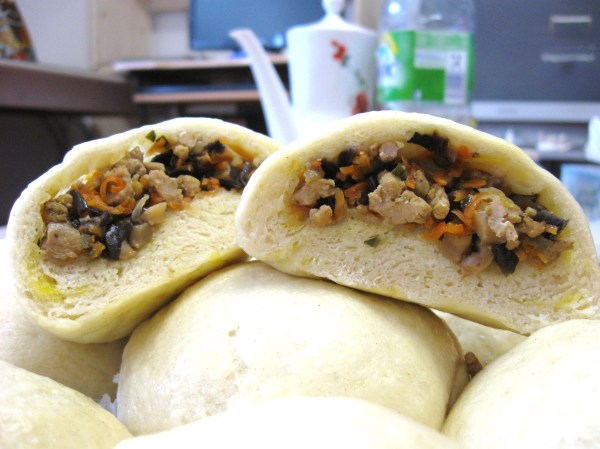Breakfast is something we often ignore when talking about cuisine. Want to find out what Vietnamese people eat for breakfast? Let's have a taste of Vietnamese breakfasts follow you feel they are really delicious foods when coming to Vietnam.
1. Pho

Pho is soup with rice or wheat based noodles that's flavored with a meat such as beef, chicken, or pork . Fresh ingredients are added to the soup or act as a topping for the soup. These ingredients may include : chopped chilies, roasted peanuts, shallots, basil, lime, bean sprouts, cilantro. Vietnamese parsley and garlic. A fish or chile sauce is almost always served with the soup. Best variety of Pho are Pho Bo Tai (rare fillet) and Pho Ga (boneless white chicken meat), Pho Bo Gau, Pho Bo Tai Nam and Pho Sot Vang. Lemon and chilly are indispensible for the best taste of Pho.
2. Bun (Rice Vermicelli)

Bun is made of rice flour but instead of flat triangle shape like Pho, Bun has small and circular shape. Recipes to make Bun’s broth are even more diverse than Pho, which result in different vermicelli dishes, most varity of Bun are Bun Cha (vermicelli and grilled chopped meat), Bun Rieu (vermicelli and crab meat soup), Bun Ca (vermicelli with fried fish), Bun Thang (varied vermicelli) and Bun Oc (vermicelli and snail), of which Bun Bo (vermicelli with beef) is specialty of Hue. Specific trait of Bun is an adequate sour taste the main ingredients of their soup are tomato, garcinia cowa and lemon lime. If you walk along some streets and stop at one rice vermicelli vendor in Hanoi or Sai Gon, you will have many chances for tasting various dishes of rice vermicelli with unforgettable flavor.
3. Mien (Cellophane Noodles/ Glass noodles)

Mien has a similar shape to Bun; however, this Chinese originated noodle is not made of rice flour; seaweed and cassava flour are used instead. That is the reason why Mien is a less-calorie food as well as a vegetarian favorable by on-diet people. Basically, main components of Mien’s broth is the same with Pho, but its spices are sourer and maybe more fishy because Mien usually eaten with sea-foods. Mien Luon (Mien with eal) is the most popular type of Mien in Vietnam, especially in Hanoi. Other variables of Mien are Mien Cua (Mien with crab meat) or Mien Ga (Mien withj chicken), Mien Ngan (Mien with goose meat).
4. Xoi (Sticky Rice)

Pho and Xoi are popular for breakfast in Vietnam. Even in the smallest lanes in Vietnam ones can find a street-stall selling Xoi in the morning or recognize one or two people carrying a basket of Xoi, covered by banana leaves. This sticky rice varies from simple low-price, some of them are Xoi Do Xanh (Xoi with green beans), Xoi Gac (Xoi colored with Gac’s oil), Xoi Ngo (Xoi wih corns), Xoi Com, Xoi Lac (Xoi with peanuts) or for commoners to higher ranks like Xoi Trung (Xoi with egg), Xoi Cha (Xoi with meat rolls) or Xoi Pate (Xoi with past ).
5. Cháo (Congee/Porridge)

Congee or rice porridge is one of the most common meals in Vietnam for breakfast, lunch or dinner. Cháo is very to cook since almost every electronic rice-cooker has porridge cooking function. Although it is considered as the poor’s food, but Cháo could be much fancier when cooked with a variety of meats. There are some kind of Chaos are Chao Ga (chao boiled with a whole chicken with bones to get the tastiest broth), Cháo Vịt (porridge with duck); Cháo Lươn (porridge with eel) and Cháo Cá (porridge with fish).
6. Trứng Vịt Lộn (Balut)

Trứng Vịt Lộn is actually duck’s embryo still laying in its shell going through fertilization process and then boiled in steamy heat. Because of this characteristic and its appearance, this dish is listed among the most terrific food for Western visitors. Nevertheless, if ones can manage your fear to taste it one time, you may find it thousand times more delicious than normal chicken egg as well as a huge amount of protein good for your heart. In Vietnam. It is favored by most people and appears in every breakfast stalls.
7. Banh Mi (Vietnamese Bread)

The sandwiches made from bánh mì include meat and soy fillings such as steamed, pan-roasted or oven-roasted seasoned pork belly, Vietnamese sausage, grilled pork, spreadable pork liver pâté, pork floss, grilled chicken, chicken floss, canned sardines in tomato sauce, soft pork meatballs in tomato sauce, head cheese and fried eggs. Accompanying vegetables such as fresh cucumber slices, cilantro (leaves of the coriander plant) and pickled carrots and daikon in shredded form. Spicy chili sauce is normally found in bánh mì sold by vendors in Vietnam.
8. Banh Cuon (Rice Flour Steamed Rolls)

Rice seems to be the mother of many Vietnamese delicious foods, yet, another specialty made of rice flour: Bánh cuốn. It is covered by a thin, wide sheet of steamed rice flour and its core filled with seasoned ground pork, and minced wood ear mushroom. Banh cuon is usually served with Cha Que and special dipping sauce named “nước chấm” made only for Banh Cuon.
10.Banh Bao

Banh bao is a simple but delicious food; it’s basically a large, round dumpling filled with various ingredients include pork, onion and sausage mushrooms. The most popular version in Saigon is a mixture of ground pork, hard-boiled quail egg and Chinese sausage. The ground pork is formed into a meatball and then the eggs and chunks of sausage are added.
The mixture is then wrapped in a slightly sweetened flour dumpling and steamed to perfection. On the street, banh bao is served directly out of the steamer so you’ll want to give it some time to cool before you dig in, or you may burn your mouth.
10. Vietnamese's 'banh'

In this section we won’t discuss about an individual type of food but dozens of them. Because it is Vietnam food offers too many breakfast cakes and each of them is as popular and tasty as one another. Some most common cakes can be named as Bánh Chưng Rán, Bánh Nếp, Bánh Tẻ, Bánh Giò, Bánh Khúc, Bánh Rán, Bánh tôm, Bánh Đúc, or Bánh Dày. There are still many more Vietnamese traditional cakes can be used for breakfast which may cost a whole essay to list out not to mention trying all of them. These are often savoury and easy to pack (like mochi in Japan) and often stuffed with mung beans. Tourists can find them in many street food stalls and from the ladies wandering the streets with a pile of Banh on their shoulder.
